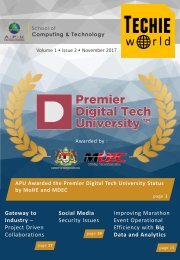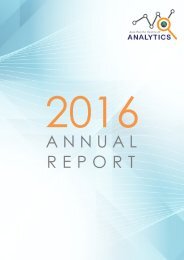Techie World [Vol 1] [Nov 2017]
You also want an ePaper? Increase the reach of your titles
YUMPU automatically turns print PDFs into web optimized ePapers that Google loves.
Improving Marathon Event Operational Efficiency<br />
with Big Data and Analytics<br />
Figure 1: Overview of the major process in improving marathon event operational efficiency<br />
with big data and analytics.<br />
Ever since Greek soldier Pheidippides ran the fabled distance between the town of Marathon<br />
and Athens, the marathon has come to represent the pinnacle event for professional distance<br />
runners and running enthusiasts alike. Whilst completing 24 ~ 26 mile run ultimately cost<br />
Pheidippides his life (historians disagree as to the exact distance), modern runners are far<br />
better equipped and prepared to go the distance. Unfortunately, the same does not apply to<br />
marathon organisers, for whom the growing popularity of the event is creating major<br />
organisational problems. The event’s popularity is illustrated by the exponential growth in the<br />
numbers of people participating in marathon events across the world, the figure increasing from<br />
25,000 to 19 million in less than 40 years. Whilst this upsurge brings with it financial<br />
opportunities, there are a number of challenges in organising a successful marathon event,<br />
including recruiting and retaining sponsors (hey, some one has to pay for it!!), and ensuring a<br />
well coordinated and safe event. The latter issue in particular is of paramount importance so as<br />
to ensure a positive experience for the runners.<br />
This is where big data rides to the rescue (or should that be runs to the rescue?). Data<br />
analytics has the potential to assist marathon organizers in determining ways to make marathon<br />
operations more efficient and effective through improvements to asset efficiency and<br />
streamlining global operations. Contiguous to this, organisers are better empowered to address<br />
runner satisfaction, all through the magic of dig data analytics.<br />
Within the context of organising a marathon, several data mining methodologies can be called<br />
upon to improve the operational efficiency of an event, such as the Cross Industry Standard<br />
Process for Data Mining (CRISP-DM), Sample, Explore, Modify, Model, Assess (SEMMA), and<br />
Knowledge Discovery in Databases (KDD). Piggy-backing on these methodologies are a number<br />
of studies into marathon running, the purposes of which are to predict runner performance and<br />
which can be utilised by organisations in the planning of their events. One such study is the<br />
Comrade Marathon Medal Prediction system.<br />
15 <strong>Techie</strong> <strong>World</strong> • <strong>Vol</strong>ume 1 • <strong>Nov</strong>ember <strong>2017</strong><br />
<strong>Techie</strong> <strong>World</strong> • <strong>Vol</strong>ume 1 • <strong>Nov</strong>ember <strong>2017</strong> 15


![Techie World [Vol 1] [Nov 2017]](https://img.yumpu.com/59550617/16/500x640/techie-world-vol-1-nov-2017.jpg)


![Techie World [Vol 2] [July 2018]](https://img.yumpu.com/61894383/1/180x260/techie-world-vol-2-july-2018.jpg?quality=85)
![Techie World [Vol 2] [Mar 2018]](https://img.yumpu.com/59922823/1/180x260/techie-world-vol-2-mar-2018.jpg?quality=85)

![Techie World [Vol 1] [Jul 2017]](https://img.yumpu.com/59177860/1/180x260/techie-world-vol-1-jul-2017.jpg?quality=85)
![Techie World [Vol 1] [Jul 2017]](https://img.yumpu.com/59160280/1/180x260/techie-world-vol-1-jul-2017.jpg?quality=85)
![Techie World [Vol 1] [Jul 2017]](https://img.yumpu.com/59158978/1/180x260/techie-world-vol-1-jul-2017.jpg?quality=85)
![Techie World [Vol 1] [Jul 2017]](https://img.yumpu.com/59114450/1/180x260/techie-world-vol-1-jul-2017.jpg?quality=85)
